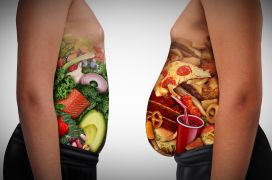Food industry needs to focus on ‘healthy’ innovation

source: TEN the export network
AMSTERDAM - 'Food companies needs to innovate, but they should focus less on economic aspects such as taste and price in favour of social values such as health and sustainability.' It is a conclusion from the thesis of Jilde Garst, who received her PhD from Wageningen University at the beginning of February 2020. She makes an appeal to companies to innovate not only in healthy products for their own profitability, but also for general, social importance. In doing so, Garst notes that there is often no consensus within the company what 'healthy' means for the innovation directions of the product range, that health is not communicated consistently and that it would be desirable for non-commercial stakeholders to involved in this.
In theory, many will agree with the conclusion drawn by Garst, but in daily practice it is proven to be difficult. In our current economic system, the economic value determines the success of a company. However, if you have developed a healthier and/or more sustainable product, it is mainly judged by the consumer on how tasty and how cheap it is. And since healthy and tasty don't always go well, a problem is created. We come across many young startups with beautiful, ideal initiatives: banana bread from overripe supermarket bananas, muesli of ‘rescued’ food, less sweet chocolate paste with dates, plant-based cheese, vegan cakes, organic sausages. Indeed, you can argue to what extent these initiatives are sustainable or healthy. But when your children are used to the very sweet Nutella and don’t like the healthier date-alternative, it's simply not bought anymore. Your company may score high on 'health', but in the meantime your sales fall in favor of that big competitor. Challenges to be faced, also for larger food companies to ensure that they are healthy and/or sustainable economically viable. But there are successful examples, such as Tony Chocolonely and The Vegetarian Butcher.
Garst claims to create a playing field, which makes clear whether companies are doing well in terms of health and sustainability. She proposes a ranking at company level, based on, for example, the percentage of healthy products. Given the discussions about health logos such as the Nutri-Score, this will also be a tricky point. The fact that she wants non-commercial stakeholders to participate actually says enough. How easy is it to come up with beautiful ideals outside the economic playing field? 'Reset the game' says Garst 'when the purpose of innovation is social value creation instead of maximizing profits'. Is this possible in our current economic system? Shouldn't we have to move to a completely different economic system, in which sustainable and health are also embedded, such as Kate Raworth's 'Doughnut economics' model?
We, human beings, are and remain particularly ambiguous creatures. As a citizen, we consider health and sustainability to be very important, but in front of the supermarket shelf we choose tasty and cheap products. And as long as companies are only judged on economic values, it remains very difficult to change towards social value creation. The reset button Garst refers to seems mostly virtual for the time being.
TEN the export network offers advice and support to food & beverage companies that dare to look across borders. We coordinate export activities, stimulate business development projects and set up new international routes. TEN professionalizes existing export activities and we are consultants working for the SIB program (Starters International Business Program of the RVO, Dutch Government) for SME companies. For more information: www.theexportnetwork.nl or contact us for an appointment: http://www.theexportnetwork.nl/contact/.
Written by: TEN the export network
Latest news
-
11 jan Nestlé Vietnam invests $100 million in coffee factory to meet growing consumer demand
-
11 jan TraceGains' Together Conference 2024
-
11 dec Alex Holt appointed Chief Sustainability Officer of Ahold Delhaize
-
29 nov Nestlé develops N3 milk with new nutritional benefits, launches first in China
-
21 nov Grocery shopping in Australia
-
20 nov Centuries-old-fermentation technique all hot again
-
12 sep The limits of exports
-
18 aug Detecting and Preventing Coffee Fraud
-
14 aug Connecting the world of food professionals
-
10 aug Sky-high expectations for vertical agriculture
Join the conversation
Are you already a member? Please
Login
Don't have an account yet? Please register